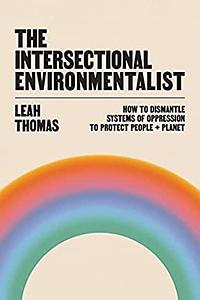Take a photo of a barcode or cover
568 reviews for:
The Intersectional Environmentalist: How to Dismantle Systems of Oppression to Protect People + Planet
Leah Thomas
568 reviews for:
The Intersectional Environmentalist: How to Dismantle Systems of Oppression to Protect People + Planet
Leah Thomas
This is such an accessible introduction to the topic. It would be great for teaching or a book club as each of the brief chapters ends with a variety of critical thinking questions. Thomas easily breaks down highly politicized terms, especially critical race theory, in order to highlight their true intent and meaning. Thomas also uses relevant examples to apply how intersectional environmentalism is relevant. My favourite (or least favourite depending how you look at it) was the example of fast fashion. I also learnt a lot about the history of Earth Day, and its connection to the Civil Rights Movement, that I didn't know about previously. My only real critique is that I wish that the book was a bit longer!
it's fine as an introduction if you're new to environmentalism and social justice in general (there is a two page spread dedicated to defining privilege) but if you have a strong foundation of knowledge in anything relating to intersectionality and environmentalism then you know most of the things present in this book. the specific historical examples or specific studies were the most educational parts for me but otherwise it was very 101 basic idea and then some very individual action (read these books, listen to these podcasts, don't buy fast fashion) which is good but left me wanting more
informative
challenging
informative
fast-paced
informative
reflective
medium-paced
Was really excited to read this book (bday gift!) but it didn’t go quite as deep as I wanted it to. This would be a great intro if you didn’t know much (or anything) about the environmental justice movement, but I wish it had been less overview and more application to case studies. My favorite part was the last chapter where she did mini case studies on lithium mining, wind energy in Mexico, and a nuanced conversation about green energy and its unintended negative consequences. The toolkit also has some good resources. Otherwise read similarly to a college paper or thesis.
challenging
informative
fast-paced
Great book to explore the intersectionality necessary for the environmental movement, I think a point that could’ve been further pushed was the need for systemic change in regards to the capitalistic system that pushes this environmental degradation in exchange for profit, the only way to fully protect our environment I believe revolves around destroying the system that perpetuates the need for profit over people and the environment
challenging
informative
inspiring
reflective
medium-paced
informative
inspiring
fast-paced







